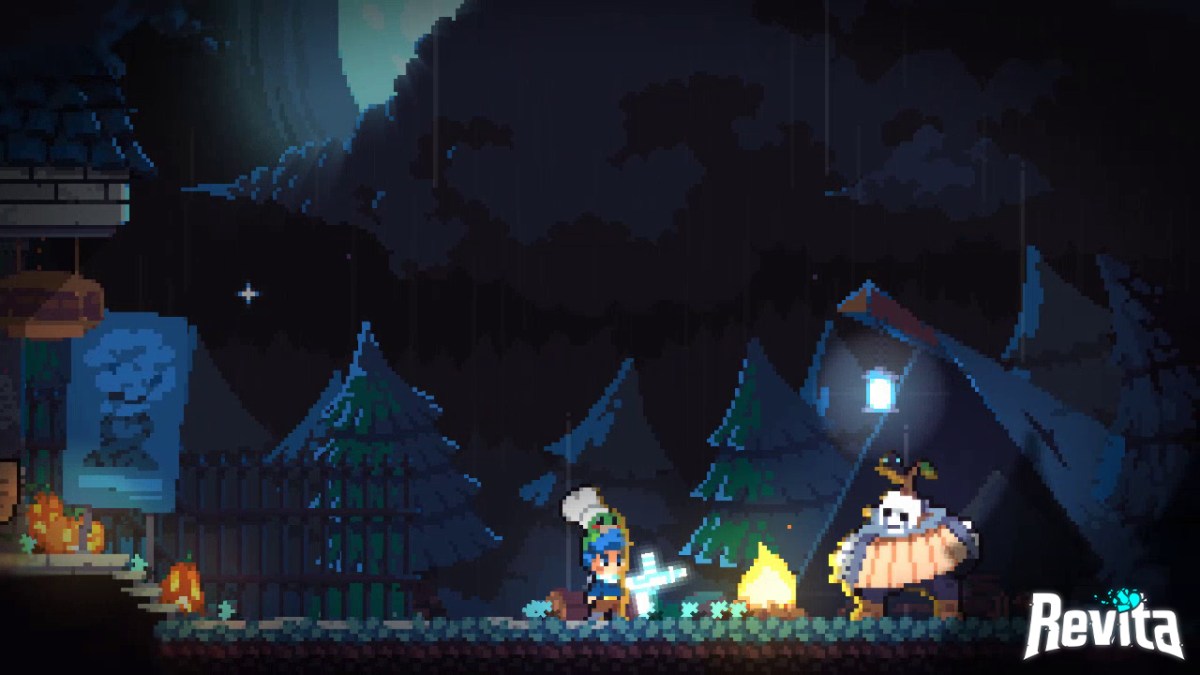Rogue-lites are my preferred way to get a shot of adrenaline. Building myself up into an unstoppable killing machine and breaking the game in an unimaginable fashion is some of the best fun I’ve had in gaming over the years. The rogue-lite genre itself has become a bit saturated, with hits like Binding of Isaac and Hades leaving many of the others in the dust. After all, it’s hard to compete with some of the best in the genre, and these games really do it justice. Nowadays, games need to carve out a fascinating niche for themselves to hold the attention of players. Revita strives to do just that as the latest in the rogue-lite adventure.
And what exactly is it that this game accomplishes? Binding of Isaac has incredible progression and enemies, Hades has extremely smooth gameplay, secrets, and a fascinating story. Revita scales things back, however, and isn’t nearly as dense as the former two games. Instead, Revita lures you into its world with charming 16-bit graphics and a great soundtrack. The visuals of the game carry much of the experience as you go from grungy area to the next, with a subway whisking you into each different location.
Don’t go spending my hearts
In Revita, you’ll have to climb a tower, clearing floor after floor of enemies and bosses as you power up your weapon. As a twin-stick shooter, you control the main character on one hand while shooting your weapon on the other. The main gimmick here, however, is you can spend your health as currency to power up your character. That’s right — in order to make yourself stronger, you have to shoot yourself in the foot numerous times. The more powerful an item, the more health you need to sacrifice. It’s a cool risk/reward system that makes things feel quite fresh.
You can gain more health by defeating enemies on each floor, who drop a number of souls on defeat. Later on, you’ll get tons and tons of souls through a unique combo system. You can stockpile said souls to gain even more max health or use immediately to refill the health you already lost. This is simultaneously challenging, rewarding, and frustrating. How far you can take your character is based on how well you play the game, naturally, but you really have to play your heart out. Sometimes, hazards on each floor can blend into the background, leading to some annoying interactions. But the game isn’t so agonizingly painful, despite its difficulty.
My main issue with progression in this game is many of the items are just not interesting. Even weak items and upgrades in other games can give you a fascinating run or challenge, but some of Revita‘s items feel boring and uninspired. Item collection and progression simply isn’t all that fun. While the gameplay is smooth, featuring a dash, wall jump, and point-and-click shooting, I wished some of the items felt a little more impactful. Of course, I’m not asking for game-breaking action every run, but things can feel pretty repetitive.
I couldn’t if I tried
Your runs also don’t feel too unique. Rogue-lites thrive with how different each run can go, but the early stages of Revita are a drag and almost always feel similar to one another. It’s an annoying grind to get to a fun spot, and that’s a big flaw of the game. Things pick up later, but the pacing to get there isn’t always on point. Enemy design is hit or miss, especially some of the bosses, which — again — feature a hefty repetition problem that made them boring to fight.
Still, the gameplay is still generally smooth and fun, but many of the gripes make Revita hard to fully enjoy at first. What does help are a number of quality-of-life features to make each run go a little faster. You can skip loading screens and cutscenes to get into the action more quickly, and there’s even a “Quick Restart” button that easily allows you to jump into another run. It’s helpful additions like these that ease the pain of the early game grind a bit, but it’s not always enough to temper the misfortune that comes from it.
Overall, your long-term enjoyment truly lives or dies based on how much you like the HP-as-currency mechanic that dominates most of the game. There are other small items, such as keys, that allow you to unlock certain things. But the main course is in your health bar, and if you can’t manage your health, then good luck enjoying the game. I don’t necessarily consider this gameplay design to be flawed, but it is something to be aware of. Your mileage will vary greatly based on how well you can dodge hazards, enemies, and bullet-hell fireballs that come at you from all directions.
Worth a shot
The game can be forgiven for many of these gameplay flaws, but you’ll really have to be merciful if you’re considering picking up Revita. It’s a visual treat, but you won’t find many emotional story beats here. The lore is minimalistic, and what we do have is on the nose.
The game is fortunate to be blessed with an amazing art style and sound design, which helps carry the game through much of its more disappointing parts. The gameplay is smooth and refined, but not particularly inspired or complex. And while the HP-as-currency mechanic is unique and (in my opinion) fun, a lot of the gameplay doesn’t really support this inspired design choice. It’s possible that you’ll have a good time with Revita, and I did for much of my playthrough as well. But unfortunately, I don’t suspect this game will make a huge wave in the rogue-lite circle. That being said, it’s worth a shot and is an absolute beauty to look at. If you give it a try, you might find something to love in this peacefully pleasant package.











Published: Apr 20, 2022 12:15 pm